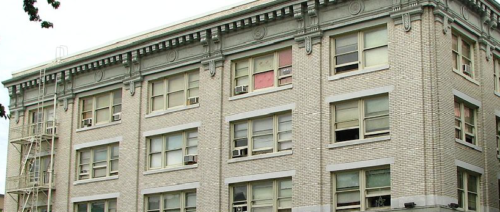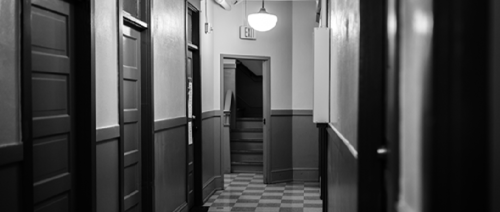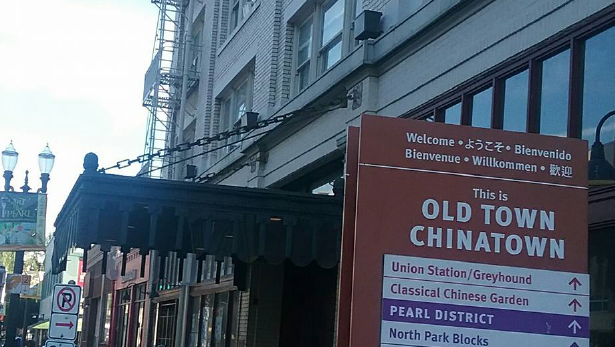A lifeline of affordable housing for many, single room occupancy hotels (SRO’s) present unique challenges to relationships and a sense of community.
“Hey Jackie, are you still looking for a place?” Jackie’s caseworker asked.
“Yes, I am!” Jackie eagerly replied.
“It’s a single room occupancy hotel…” her caseworker continued.
“I don’t care. Right about now I’ll take a hole-in-the-wall. I’ll take a pup tent.”
“Hey Jackie, are you still looking for a place?” Jackie’s caseworker asked.
“Yes, I am!” Jackie eagerly replied.
“It’s a single room occupancy hotel…” her caseworker continued.
“I don’t care. Right about now I’ll take a hole-in-the-wall. I’ll take a pup tent.”
Jackie was ecstatic to hear her application for one of the nearly 100 square foot rooms was accepted. Even her adult children were “excited.” “Because I was basically homeless,” Jackie recalls. “I was in a homeless shelter.”
And when you’re homeless, having a place of your own and access to a bathroom 24/7 – even a shared one – can feel like luxury accommodations.
And Jackie’s far from alone. Another potential renter recently posted on a building’s Facebook page:
“Just dropped off my application
and $42 fee! Wish me Good Luck!”
“Just dropped off my application
and $42 fee! Wish me Good Luck!”
Even after two years, Portland’s official “housing emergency” is still uncontained1. There are plenty of options for those looking for apartments at the top-end. But when the average Portland rent surpasses $1,300 a month2, there is intense competition for affordable housing. Even if the rooms are marginally larger than a parking space, like those at many SRO’s.
As the name suggests, SRO’s don’t allow roommates. And a typical room can often only accommodate little more than a single bed.
But they’re priced accordingly, making it possible for very low-income folks to live in a city where rent is almost always out of reach.
And while a few SRO’s have a lobby where residents can gather, a community space isn’t enough. Living in an SRO presents unique challenges that impact making and keeping friendships.
And maybe more significantly, hinders residents from feeling that they belong to a community that accepts and cares about them.
Our member, Jackie, gives us an intimate glimpse at why a sense of community – and meaningful relationships – can be unusually challenging when living in SROs.

We think it’s important to hear her story – complete with the gritty and sometimes uncomfortable details – to get a fuller picture of the daily reality, and the accrued trauma our neighbors face.
This is Jackie’s answer, in her own words, to the question:
Q: “Why are relationships more difficult in an SRO than in other places?
A: “It’s a combination of things. The noise, the mental illness, and…I’m not sure what to call it…”
When I go to bed at night, I’m wanting to sleep. I have three neighbors on my floor – one young kid and two older people – they yell, and they yell, and they yell. Day and night. One of them is kiddy-corner from me. I’m lying there trying to sleep. And he’s yelling and screaming. And he’s beating on his wall.

One of my neighbors finally went over and said, “Could you please not beat on the wall, and could you please quiet down? You’re really disturbing me. I can’t even sleep.”
He told her, “He was trying to get rid of the aliens and if she had a problem with that, to contact the FBI.”
When you go down and talk to management about it, there is only so much they can do. But the trio of night screamers is disturbing our sleep.
And that makes me grumpy during the day.
But what irritates me more is…if somebody isn’t seen for a day or two, nobody cares.
That’s even harder to take.
We had another neighbor pass away sometime earlier this week. It took days for someone to notice.
I’m the type of person who will sit downstairs. And if I don’t see somebody go in and out for a while, I will finally say something like, “Hey have you seen so and so? I haven’t seen her for a while. That’s not like him. That’s unusual for her.”
Recently, there was a neighbor I hadn’t seen for a while. When she walked through the door, I said, “I didn’t see you, I was worried. I thought something was wrong with you.”
“I’m sorry Jackie,” she replied. “I didn’t think anybody cared.”
And I was like, “I care.”
Somebody should know where they were and not worry that they were up in their room, hurting and not able to call out – or worse…”
The feeling that nobody cares…One can only imagine how a person begins to internalize that message – year-after-year.
While SRO’s are a scarce and desperately-needed affordable option, the structure doesn’t naturally buoy relationships.
Residents live alone. Many don’t have close family or friends upon move-in. And the modest room size makes gathering with friends a challenge – especially at those buildings without a lobby.
And there are undoubtedly challenges from the aggregation of folks struggling with mental health issues. Issues that perpetually impact Jackie’s sleep.
That is why Maybelle Center for Community exists.
Living with the daily reality of feeling alone – even while surrounded so many people – effects mental health and physical health. That’s because genuine connection and community are basic human needs – just like food and shelter.
Simple things like pairing volunteer visitors with residents at SROs. Our community choir bonding over a shared experience. Or hosting a dominoes tournament in our Community Room – all meaningfully deepen relationships.
And it builds a community at Maybelle Center – that loves and accepts each other, right where they are.
You are an important part of that community too.
Would you be willing to show you care by giving a donation? Every penny will help.
Your gift today will be put to work immediately – to build community and connection with our neighbors. Neighbors like Jackie.
 Special Thanks
Special Thanks
Thank you, Jackie, for opening up your life.
And more importantly, thank you for caring.
This is part 2 of Jackie’s story. If you missed part 1, you’ll want to read it now: Reaching out in the midst of healing from trauma.




Comments are closed.